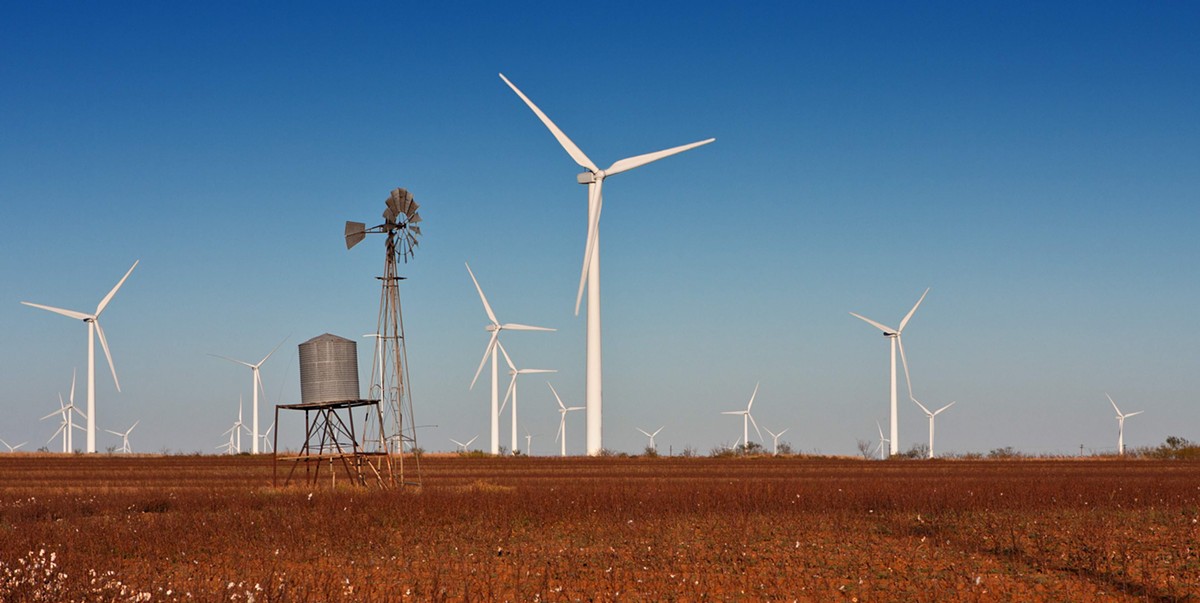Twenty years ago, wind and solar energy accounted for a meager 0.7% of Texas’ electricity generation. Today, according to the US Energy Information Administration, that figure now stands at 26%.
Texas’ quiet rollout of a Lone Star Green New Deal ought to be heralded as a remarkable achievement — one unrivaled anywhere else in the U.S. Yet Texas-sized investment in renewables remains something of an embarrassment to fossil fuel-ingratiated politicians of the GOP. Publicly, at least, they continue to call human-induced global warming a hoax concocted by commies to force us to build bike lanes and switch to an all-insect diet.
Writing for pro-democracy advocacy group Indivisible Houston, Stephanie Koithan aptly described the bills Texas lawmakers sent to Gov. Greg Abbott’s desk during the current session as “the legislative equivalent of tossing a Molotov cocktail behind them as they walk away.”
Senate Bill 2627 provides some “$7.2 billion in low-interest loans to support new methane gas power plants,” according to the nonprofit Environment Texas, while House Bill 5 offers power plants “abatements on school taxes for new manufacturing facilities.” Abbott is also expected sign into law the imposition of costs for new transmission lines on solar and wind companies looking to connect to the grid. Proposals to increase energy efficiency or, goodness forbid, set ecologically responsible emissions goals died on the vine.
All this while the planet sizzles. Temperatures in Siberia recently reached 100 degrees, likely for the first time ever, and climate researchers say it’s already too late to save summer Arctic sea ice.
Increasingly alarming studies released this month foretell that, by century’s end, a few billion people will be driven out of the “historical climate niche” as we torch the planet. Deaths due to extreme heat in the Lone Star State reached a two-decade high last year, with pets and people keeling over by the hundreds.
“Politicians here rarely discuss the need for reducing greenhouse gas emissions,” the Texas Tribune reported recently, stating the tragically obvious. This even though “the state suffers the hotter summers, stronger hurricanes, and heavier rains that climate change has brought.”
Check the weather app on your smartphone and you’ll discover that 13 of the last 30 days in San Antonio exceeded the World Health Organization’s recommendations for the short-term exposure to particulate matter, due in no small part to the nearby fracking of the Eagle Ford Shale. That means more chronic bronchitis, more lung cancer and heart disease, and more asthma, particularly for those who are sensitive, like the young and the elderly.
“Texas industrial facilities reportedly released 135 million pounds of illegal air pollution in 2018, or more than double the amount from the previous year,” according to Swiss air-quality firm IQ Air’s rundown for our city. Yet the “penalties for illegal emissions from all Texas facilities only amounted to $2 million, or roughly one cent per pound” — a number “less than 1/100th of what [the state] could have charged under existing law.”
However, when Texas’ business-fawning culture results in lots of wind turbines and solar panels, that’s when it’s time for Big Government to intervene.
“Texas Republicans have had to abandon their own free-market, anti-regulation ideology in the effort to strangle wind and solar power,” economist Paul Krugman opined in the New York Times. “In the minds of Texas right-wingers the wind has become woke” and “something to be fought even if it hurts business and costs the state both money and jobs.”
Wind and solar are the least expensive means of generating power, according to the Texas Consumer Association, resulting in an astounding $31 billion dollars in wholesale electricity savings over the past decade. If lower electric bills are “woke,” I’m betting most Texans wouldn’t mind enjoying a Bud Light while watching Disney’s revamped Little Mermaid.
How can Republicans justify burdening customers with larger bills?
In part by taking cues from the Texas Public Policy Foundation, a right-wing Austin think tank bankrolled by billionaire oil tycoon Tim Dunn. After all the TPPF helped nudge along a well-orchestrated blame-shifting operation that tried to pin the deadly 2021 blackouts on renewables — even though research suggests that energy companies’ skimping on weatherization at natural gas and coal plants was the primary culprit.
And there may be an even more sinister explanation, business columnist Chris Tomlinson revealed on The Carbon Copy, a weekly podcast focusing on moving beyond fossil fuels.
“There is some question what the problem really was,” Tomlinson said, “because a lot of those gas facilities shut down for lack of gas, not because the facilities broke.”
“Because the pipes and wells froze,” host Stephen Lacey interjected, recounting the conventional wisdom.
“I mean, that’s the official excuse,” Tomlinson eventually continued. “But there’s a lawsuit right now that looks at pipeline flow data and accuses the pipeline companies of withholding gas in order to drive up prices.”
That’s a rather startling accusation that implicates artificial scarcity in the preventable deaths of hundreds.
In the aftermath of Hurricane Harvey, when 30 to 60 inches of rain fell on Houston and surrounding areas, erstwhile Texas governor and then-U.S. Energy Secretary Rick Perry declared that state attorneys general “will be watching to make sure there’s not price-gouging going on, and anybody considering raising gas prices above what would be considered appropriate needs to watch out.”
But to play capitalism’s advocate for a second, why shouldn’t I have the right to sell whatever I privately acquire through legitimate means at whatever price I please? And who is a central authority to decide what’s appropriate? If some poor soul fleeing a hurricane is willing to pay me $500 for a tank of gasoline, or electricity prices skyrocket during a freeze or a heatwave, why isn’t that just my good fortune, broader societal consequences be damned?
Evidently even supporters of deregulation and opponents of price controls discover their inner socialist during an emergency. If only we adopted such prudence before the crisis strikes.

